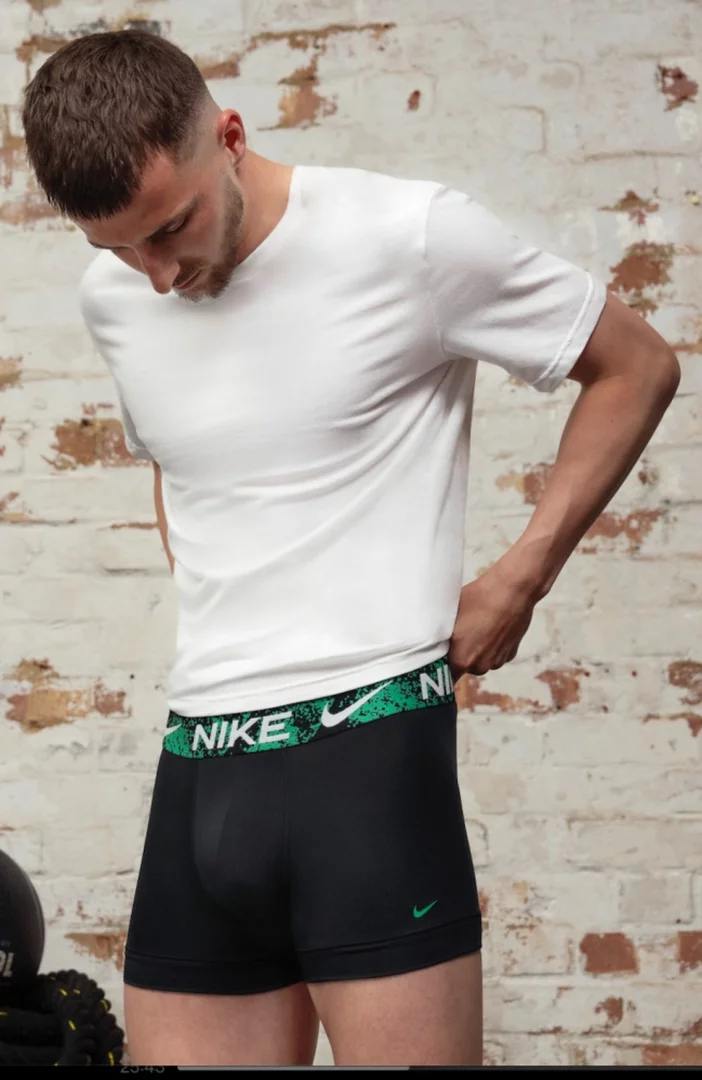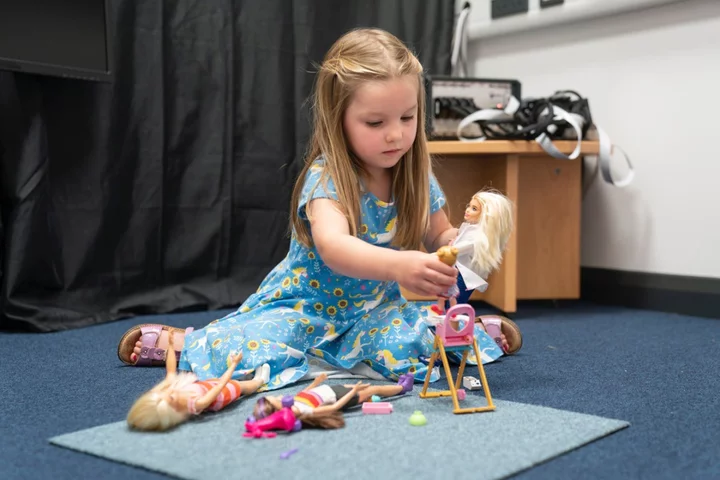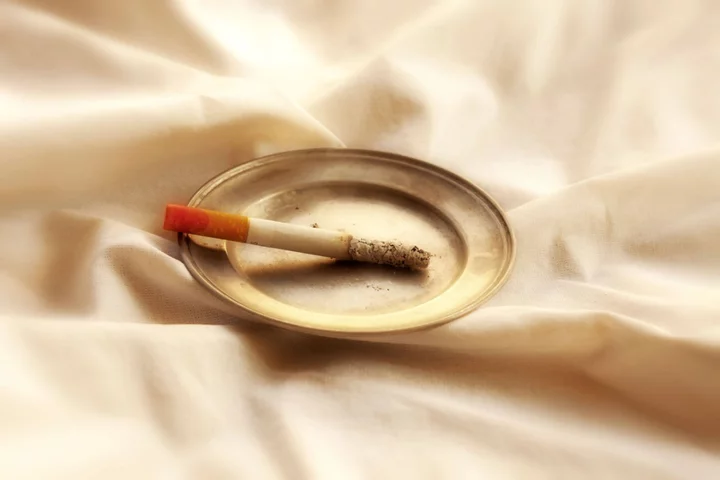
Elizabeth Debicki 'always' admired Princess Diana’s 'iconic' style
'The Crown' star Elizabeth Debicki “has always” admired Princess Diana’s “iconic” style before she donned her looks for two years for 'The Crown'.
2023-09-28 21:55

Mason Mount is the face of Nike's new underwear campaign
Manchester United star Mason Mount is fronting the Autumn/Winter 2023 Nike Campaign.
2023-09-28 21:47

To the very end, 'Physical' put in the sweat to break down diet culture
AppleTV's 1980s-set drama series 'Physical' might be over, but creator Annie Weisman hopes the team's efforts to dismantle diet culture are just warming up.
2023-09-28 21:47

JetBlue Sees Revenue at Low End of Outlook, Higher Fuel Costs
JetBlue Airways Corp. issued its second warning in as many months, saying revenue this quarter will come in
2023-09-28 21:24

The centuries-old card game of bridge offers a sharp contrast to esports at the Asian Games
The centuries-old card game of bridge is being played at the Asian Games
2023-09-28 20:54

Disney Snags Rock & Roll Hall of Fame Ceremony From HBO
Disney+ has become the new broadcast home for the Rock & Roll Hall of Fame show. The 38th
2023-09-28 20:51

Private investigator shares tips to spot a cheater
A private investigator has revealed the top signs that your partner is cheating on you. Charlotte Notley, from Norwich, has spent years investigating suspicious activities, two-timing spouses, and secretive dalliances. Advising people to keep tabs on their other half, she recommends everything from checking browser satnav destinations to surprising your partner at work. Now she shares tips on how to spot a cheater, telling people to trust their guts. “Distance will be the first indicator,” the 32-year-old told NeedToKnow. “Hiding their phone and unexplained times away without much of an explanation is another sign. Check for changes in their social media- new followers and friends,” she said. “Check their browser history on shared devices. Check previous destinations on a Satnav and make a surprise visit to your partner's work or usual place they should be." “You know your partner the best, so if something feels off, then it probably is. “Most clients who come to us know there is something not right and they usually are correct. “Secretive behaviour is a key indicator for any relationship as trust must always be there. “If you feel concerned, ask your partner to reassure you and your trust. “If you are still not satisfied then trust your instinct.” According to the World Population Review, approximately half of the people in married relationships cheat on their spouse. Between January and March this year, 28,865 divorce applications were registered, reports Gov.co.uk. “If you have exhausted all avenues to get to the truth yourself then it is best to hire a professional,” she said. “Private Investigators cannot go through someone’s phone or breach any UK GDPR laws, therefore it is only for the case of if your partner is physically spending time with someone else that a PI can help but ensure the cost is always worth the reward. “Having evidence of your partner cheating will not assist in any divorce or legal proceedings but it will give you peace of mind one way or another.” However, not everything is always as it seems, with some surveillance efforts turning out to be wasted on innocent people. “We conducted surveillance for a female who was adamant her husband was cheating on her. “It turns out he was spending time in a restaurant car park with a coffee and a book. “He was being dishonest about it but he certainly wasn’t having an affair.” Sign up for our free Indy100 weekly newsletter Have your say in our news democracy. Click the upvote icon at the top of the page to help raise this article through the indy100 rankings.
2023-09-28 20:48

Nike Set to Shed Light on Pinched US Consumers as Shares Sputter
Nike Inc. is set to offer a crucial look at the financial health of American households as Wall
2023-09-28 20:24

Fake belly buttons being sold online 'to make legs look longer'
Fake belly buttons are being sold online in a bid to make people's legs look longer. The stick-on buttons have reportedly been created to boost people’s confidence. The stickers are intended to be stuck on your stomach, a few centimetres above your real belly button. The real one should then be covered with a skirt of jeans, in order to make the torso seem shorter, and the legs longer. The curious beauty product can be bought on multiple websites, including eBay, where you can buy a pack of 10 sheets for £3.85. The listing appears as: "Realistic simulation belly button for woman girl summer party." The condition is described as new, with sixteen belly button stickers that can be seen per sheet. The idea is popular in China – but now they are being sold to buyers in the UK. In a viral TikTok video, user ShiYiTongYa told viewers: "It's quite natural and I think it looks better than my real belly button. In normal situations, no one's going to come up to me, scrutinise my belly, and figure out if my belly button's real." A separate video shows creator LiangBuZhengYy advising people to use a plaster over their real belly button as a disguise. Sign up for our free Indy100 weekly newsletter Have your say in our news democracy. Click the upvote icon at the top of the page to help raise this article through the indy100 rankings.
2023-09-28 19:51

Some children avoid sleepovers due to fears of wetting the bed
Eight in 10 children who experience bedwetting have never attended a sleepover - because they’re too embarrassed. A survey of 742 adults, with children aged 4-11, found that 69 per cent of kids have turned down an invite to a sleepover party. And nearly as many (67 per cent) of parents have declined an invitation on behalf of their child. To help parents and kids deal with the experience, and help kids make friends and gain independence through sleepovers, Pampers Ninjamas teamed up with Dr Ranj Singh on educational and fun content discussing bedwetting, and how to prepare for nights out of the home. The three-part series provides education about why bladder leaks can happen, as well as practical tips on how to manage them, particularly during sleepover moments. Paediatrician, TV presenter and author Dr Ranj, said: “Sleepovers can play an important role in developing the confidence and independence of children, as well as for their enjoyment. “So I am proud to be helping the 82 per cent of children who are currently missing out, to offer practical advice as to how to better prepare for overnight stays with friends and family.” The research also found more than a quarter (26 per cent) of respondents are not comfortable discussing bedwetting with parents hosting sleepovers. And 35 per cent report an increase in bedwetting before going back to school, suggesting scholastic stress could be a trigger. To combat the situation, 76 per cent have invested in a waterproof mattress, while 68 per cent have purchased nappies for older children. Read More Playing with dolls could help a child’s social development Study finds free childcare reform has ‘little benefit’ to poorer families Most children in kinship care living with at least one grandparent, figures show
2023-09-28 17:53

Playing with dolls could help a child’s social development
Playing with dolls could help the social development of children - including those with neurodiverse conditions such as autism, according to a study. The research, from Cardiff University, found children exhibiting higher levels of autism traits showed increased brain activity in a key region associated with social processing when engaging in conversations with individuals during doll play. The new findings suggested that broader social engagement with others while engaging in doll play was a unique pathway to social development for these children. This was in contrast to what was observed in neurotypical children, who were more likely to discuss the dolls’ thoughts and emotions. However, researchers said that despite this difference, it showed that both groups may be able to benefit from doll play by using it as a tool for practising social scenarios and developing social skills, such as empathy. The findings are the latest release from a multi-year study by the Centre for Human Developmental Science at the university’s School of Psychology. Previous years have focused on neurotypical children and found wide-ranging social and developmental benefits of playing with dolls. Now, in its third year, the research team has replicated those results with a more diverse range of participants, including children aged between four and eight displaying both high and low levels of traits associated with autism. Lead researcher Dr Sarah Gerson said: “Our study shows that doll play can encourage social processing in children, regardless of their neurodevelopmental profile. “The findings show that all children, even those who display neurodivergent traits commonly associated with autism, may use doll play as a tool for practicing social scenarios and developing social skills, such as empathy.” State-of-the-art functional, near-infrared spectroscopy equipment was used to explore brain activation while children played with dolls and on tablets, both by themselves and with another person, replicating conditions from the first year of the study. While observing children, researchers saw increased brain activity in the posterior superior temporal sulcus (pSTS) region - which is heavily involved in social and emotional processing such as empathy - when playing with dolls, for both play with a social partner and during solo doll play, but less so during solo tablet play. The study’s results suggest that doll play could support social processing, regardless of a child’s neurodevelopmental profile, but through different pathways. For children displaying fewer autistic traits in the research, talking about the mental states and emotions of the dolls they were playing with was associated with increased pSTS activity. In contrast, for those displaying more autistic traits, talking with others during doll play, even when playing by themselves, led to more social processing on a neural level. Other research has shown that social processing and empathy skills are important determinants in children’s future emotional, academic, and social success. The study was a collaboration with the Wales Autism Research Centre. ‘Create a more inclusive and supportive environment for their development’ Its director Dr Catherine Jones said: “The study reinforces how it is important that that we acknowledge and value neurodiversity. “This means recognising and valuing the diverse ways in which children’s brains work and approaching social development in a way that is inclusive and accommodating for all children, regardless of their neurodivergence. “By embracing all ways that children choose to play, we can create a more inclusive and supportive environment for their development.” Since the landmark publication of Piaget’s theory of cognitive development, the effects of play have been thought to be positive for kids’ social skills and creativity, but this has never been scientifically evidenced at the brain level. The multi-year long-term study, commissioned by Barbie, is the first time key Piaget theories on play have been scientifically evidenced via brain imaging and the first to use neuroimaging evidence with natural doll play, meaning there was no prescribed storyline to show how the brain is activated during doll play. Michael Swaisland, head EMEA of insight and analytics, Mattel, said: “We are proud to know that when children, regardless of their neurodevelopmental profile, play with Barbie, their playtime may benefit their development. “As Barbie continues to inspire the limitless potential in every child, we are delighted to know, through neuroscience, that playing with dolls may encourage the development of social skills such as empathy in children, including those who display neurodivergent traits commonly associated with autism. “We look forward to uncovering even more benefits of doll play through our long-term partnership with Cardiff University as we look to shine a light on the benefits the play pattern has towards development, that parents might not have been aware of.” Parents and caregivers can visit here to learn more about the research and access resources. Read More Toys children play with can have an effect on their success in adulthood The best exclusive discount codes this payday Many parents of under 5s on less than £50k ‘quit work due to childcare costs’ – survey
2023-09-28 17:50

Smokers 2.6 times more likely to give birth prematurely
Women who smoke during pregnancy are 2.6 times more likely to give birth prematurely compared with non-smokers – more than double the previous estimate, new research suggests. The University of Cambridge study also found smoking meant the baby was four times more likely to be small for its gestational age, putting it at risk of potentially serious complications including breathing difficulties and infections. There was no evidence caffeine intake was linked to negative outcomes. We’ve known for a long time that smoking during pregnancy is not good for the baby, but our study shows that it’s potentially much worse than previously thought Professor Gordon Smith, University of Cambridge Professor Gordon Smith, head of the department of obstetrics and gynaecology at the University of Cambridge, said: “We’ve known for a long time that smoking during pregnancy is not good for the baby, but our study shows that it’s potentially much worse than previously thought. “It puts the baby at risk of potentially serious complications from growing too slowly in the womb or from being born too soon. “We hope this knowledge will help encourage pregnant mums and women planning pregnancy to access smoking-cessation services. “Pregnancy is a key time when women quit and if they can remain tobacco free after the birth there are lifelong benefits for them and their child.” The NHS recommends that women who are pregnant should stop smoking and limit their caffeine intake because of the risk of complications to the baby. When the toxins from smoke travel through the bloodstream to the baby, it struggles for oxygen. When this happens it affects their development, and is linked to premature birth and low birthweight, though it has also been linked to a reduced risk of pre-eclampsia (high blood pressure during pregnancy). High caffeine intake has also been linked to lower birthweight and possibly foetal growth restriction. But caffeine can be more difficult to avoid than cigarette smoke as, as well as being found in coffee and tea, it can be found in chocolate, energy drinks, soft drinks and certain medications. Researchers say studies looking at the links between smoking and caffeine and their impact on pregnancy tend to rely on people reporting how much they have consumed, or exposure to smoke, data which is not always reliable. Blood tests for metabolites – chemical by-products created when substances such as tobacco and caffeine are processed in the body – might be more accurate. Researchers at Cambridge and the Rosie Hospital, part of Cambridge University Hospitals NHS Foundation Trust, recruited more than 4,200 women who attended the hospital between 2008 and 2012 as part of the Pregnancy Outcome Prediction (POP) study. The team analysed blood samples taken from a group of these women four times during their pregnancies. To assess exposure to cigarette smoke, the team looked at levels of cotinine, which can be detected in blood, urine and saliva. Only two out of three women with detectable levels of cotinine in every blood sample were self-reported smokers, showing that this measure is a more objective way of assessing smoking behaviour, researchers say. A total of 914 women were included in the smoking analysis. Of these, 78.6% were classified as having no exposure to smoking while pregnant, 11.7% as having some exposure and 9.7% as having consistent exposure. The study, published in the International Journal of Epidemiology, found that compared with those without smoke exposure while pregnant, those with consistent exposure were 2.6 times more likely to experience spontaneous preterm birth. According to the researchers, this is more than double the previous estimate of 1.27 from an analysis of multiple studies. They were also 4.1 times as likely to experience foetal growth restriction. Additionally, babies born to smokers were found to be on average 387g lighter than babies born to non-smokers – that is, more than 10% smaller than the weight of an average newborn. This increases the risk that the baby will have a low birth weight (2.5kg or less), which in turn is linked to an increased risk of developmental problems as well as poorer health in later life. Unlike in previous studies, the team found no evidence that smoking reduced the risk of pre-eclampsia. To assess caffeine intake, researchers looked for the metabolite paraxanthine in 915 women. Of these women, 12.8% had low levels of paraxanthine throughout pregnancy (suggesting low caffeine intake), 74.0% had moderate levels and 13.2% had high levels. The researchers say there was little evidence of an association between caffeine intake and any of the negative outcomes. However, because the researchers did not study all possible adverse outcomes of pregnancy, and some of the outcomes not studied – such as stillbirth – have been associated with higher caffeine intake in previous studies, they cannot interpret the findings as indicating that current recommendations around caffeine intake should be changed. The work was supported by the National Institute for Health and Care Research (NIHR), Cambridge Biomedical Research Centre and the Medical Research Council. Read More Charity boss speaks out over ‘traumatic’ encounter with royal aide Ukraine war’s heaviest fight rages in east - follow live Female students ‘more than twice as likely’ to be affected by poor mental health, research shows Many parents of under 5s on less than £50k ‘quit work due to childcare costs’ – survey 5 trainer trends that will be everywhere this autumn
2023-09-28 17:26
